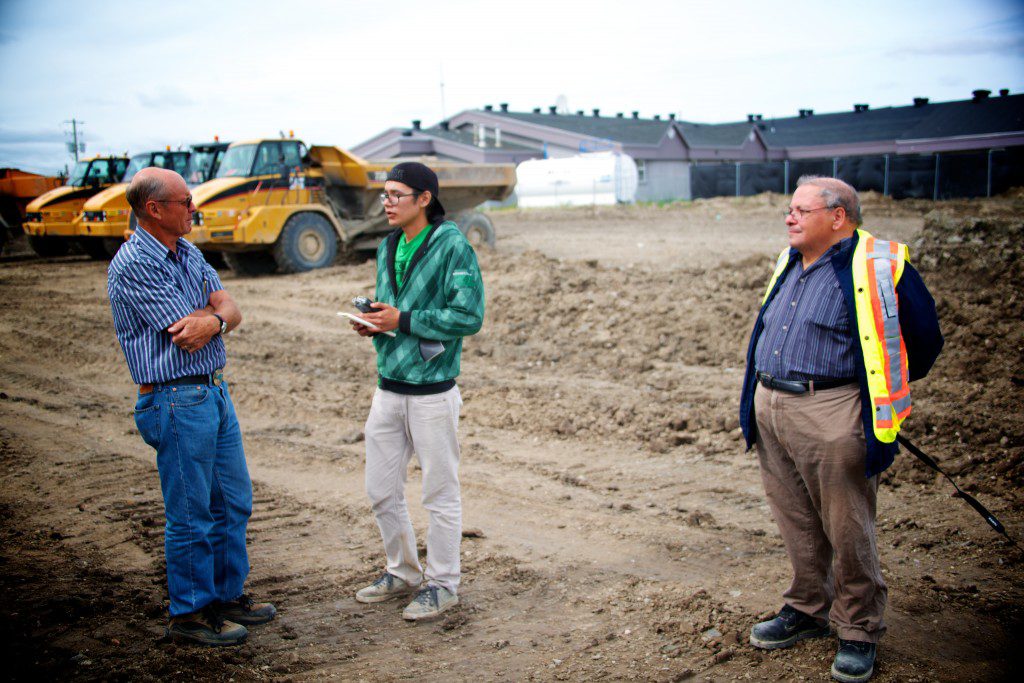If local news will be the saviour of Canadian journalism, what are you going to do about it, broadcasters?
With the Local Programming Improvement Fund set to dry up next year, television networks must find ways to cover news outside big cities without blowing the budget. But cheaper isn't always better
Last month, convicted killer Kyle Halbauer talked to reporter Dan Zakreski about how he started dealing cocaine. The exclusive CBC Saskatchewan interview was a revealing look at Saskatoon’s drug trade and it’s the kind of in-depth story that managing director John Agnew would love to do more often. But the report was possible only with money from the Local Programming Improvement Fund (LPIF)—which has less than a year left to live. The LPIF meant that Agnew’s team was able to send out more reporters and cameras and do more thorough reporting and, he says, “People were delighted to see it.”
Created in 2008 by the Canadian Radio-television and Telecommunications Commission (CRTC), the LIPF helps conventional television stations in non-metropolitan markets cover local news. In addition to pieces such as Zakreski’s, for example, CBC was able to bring back Saskatoon’s suppertime news show. But the CRTC no longer sees the LPIF as necessary, claiming broadcasters are now providing enough local coverage online. The commission will phase out the program by August 31, 2014. “I think it’s going to pose challenges for us,” says Agnew. “Personally, I wish it wasn’t going away.” Sending reporters and cameras to smaller and remote areas is expensive so the struggle to cover local news is nothing new, but broadcasters will need to find new ways to satisfy the demand for these stories as government funding dries up.
CBC certainly isn’t giving up on smaller communities. “Local is top of the pile in terms of things that people care about,” says Jennifer McGuire, editor-in-chief of CBC News and Centres. “Local is really, really important.” But she says budget constraints mean juggling to cover every region is a challenge. In the past, the network has taken a “we’re in, we’re out” approach to television in local markets, making it tough to grow roots in these places. CBC’s strategic plan, “2015: Everyone. Every Way,” calls for a reallocation of resources to continue serving areas outside big cities. While CBC is expanding its digital presence in markets such as Hamilton and Kitchener-Waterloo—launching new radio shows in combination with online content—McGuire says there is still a strong expectation that CBC is present on TV as well.
Online forums are one way broadcasters are trying to keep up with the desire for local community coverage. CBC has Your News, CTV operates MyNews and CityNews also provides a portal for viewers to share their stories by uploading photos and videos. These websites allow broadcasters to take advantage of citizens and their smartphones to see what’s going on in communities beyond their regional stations. “There are 27 million mobile phones in Canada, most of them camera capable, so it’s a huge force multiplier,” says Mark Sikstrom, an executive producer at CTV News, adding that contributions from MyNews members fall into one of two categories: breaking news and human-interest stories. “Not everything on MyNews is necessarily journalistic,” Sikstrom admits, noting that on Halloween the site was inundated with photos of pets in costume.
But citizens do cover news the network’s reporters can’t get to in time. In October, Mathieu Dumoulin saw ambulances and fire trucks surrounding a white vehicle that was on its side with the driver’s side door leaning on the pavement and the trunk door wide open. Most of the crowd on the sidewalk along Ottawa’s Bank Street just watched the firefighters and
paramedics work, but Dumoulin pulled out his phone and started documenting it. He then uploaded one video and four photographs to his MyNews account.
Still, online community forums rarely capture the nuances of local experiences. Rachel Pulfer, executive director at Journalists for Human Rights (JHR), an organization that trains reporters and raises awareness of human rights issues, contends that to report successfully on a community, journalists need to be there. The Aboriginal Project, for example, is a new JHR program that aims to increase and improve the coverage of social and economic issues of aboriginal communities in Northern Ontario. Pulfer says coverage of this region can take on “an increasingly negative tone” when journalists report from offices in Toronto with limited access to local sources. A JHR report called “Buried Voices: Media Coverage of Aboriginal Issues in Ontario” found that 39 percent of stories published between June 2012 and May 2013, “portrayed Aboriginal people and issues in a negative light.” Twenty percent were positive and the rest were neutral. The goal of The Aboriginal Project is to increase the number of Aboriginal stories in mainstream news and improve the relationship between journalists and these communities.

Mentee, Richard Spence, working on a story about a diesel leak under an elementary school in Attawapiskat that had been left for 23 years Photo by Danny Kresnyak
GoJournalism is a website that also tries to connect reporters in local areas with news organizations. Joe Banks, professor of journalism at Algonquin College and founder of the website, says GoJournalism is a response to the declining demand for local freelance journalists in the Ottawa area. Banks notes that a lot of beats, including the school board and the public utility commission, are not being effectively covered. “And yet these are the areas that affect people’s income everyday.” Similarly, he believes city council doesn’t get enough attention. But that’s an example of a beat CBC’s Regina station has been able to cover more effectively with funding from the LPIF.
Local coverage helps news organizations attract viewers, but it requires time and resources to do it properly. “I still feel that local will be the saviour of Canadian journalism,” Banks says. “Cede international news to The New York Times and BBC.”
Although the CRTC is phasing out the LPIF, broadcasters know they can’t give up on local news. “We’re always going to need reporters to get out there,” says Agnew. “I think it would be a great mistake to just hand over newsgathering.”














